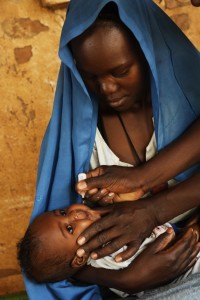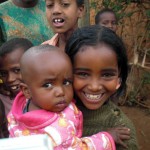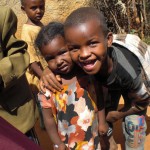For over two years 165,000 children in conflict zones of Blue Nile and South Kordofan in south eastern Sudan have been under fire; with little food and clean water, few schools and some have been forced to dig out small shelters in caves to flee the [...]]]>
For over two years 165,000 children in conflict zones of Blue Nile and South Kordofan in south eastern Sudan have been under fire; with little food and clean water, few schools and some have been forced to dig out small shelters in caves to flee the fighting. Away from cameras, their plight is unseen and underreported.

An infant is vaccinated against polio in the town of Kabkabia in North Darfur State. Photo credit: © UNICEF/NYHQ2006-0565/Noorani
These children have had almost no healthcare and little or no protection. The conflict is robbing them of their childhood. And now they are in grave danger from a disease that has the power to disable them as much as any weapon: Polio.
As polio spreads across the war zones of Syria and Somalia, and stalks the Horn of Africa, our great opportunity to rid the world of another debilitating disease since small pox is being thwarted.
Last week seven million children across Sudan were reached as part of a national polio vaccination campaign. However, the 165,000 children living in the conflict zones of South Kordofan and Blue Nile missed out.
We wait for final agreement from the conflicting parties, the Government of Sudan and the Sudan People’s Liberation Movement North (SPLMN), to allow the safe passage of our staff and vaccines to reach these children. We have heard and seen good intentions, support and commitments over the past few weeks. We welcome every ongoing effort to get the job done.
Vaccinating these children against polio would just be the beginning. Once the door is open for polio vaccines, easy to administer than other vaccines, the aim is to forge a path of peace for much more: clean water, medicines, and the chance to go to school. We can only do this together with both parties to the conflict.
We will not give up hope. We cannot let conflict stop us. We are ready with the vaccines, the equipment, the people and the resolve to reach each one of those children.
We have 165,000 reasons and no excuses.
Twitter handle: @gcappelaere
Please use hashtags: #endpolio #Sudan #165000reasons
Web address: www.unicef.org/
]]>This was not an ordinary polio vaccination day for the children of Babile and Kombolcha, small towns about 500 km East of Addis Ababa. Ferenjis (foreigners in Amharic) [...]]]>

By Gifti Nadi
This was not an ordinary polio vaccination day for the children of Babile and Kombolcha, small towns about 500 km East of Addis Ababa. Ferenjis (foreigners in Amharic) had arrived!
About 100 Rotarians from the USA and Canada paid their way to Harar and Dire Dawa in Eastern Ethiopia to join local health workers in a massive drive to vaccinate 11.5 million children under five nationwide.
In recent years, 24 cases of polio have been detected in Ethiopia, likely coming from Sudan, says the World Health Organisation.
We travelled in small groups to the towns nestled against the backdrop of stunning mountains. We went door to door and were warmly welcomed by the primarily Muslim, Oromo and Somali families.
Last year, a survey showed that 70 per cent of mothers know about polio’s dreadful consequences and the benefits of vaccination, thanks to the work of dedicated community health workers.
Still, some believe that the vaccine might hurt the kids, so it was good to see the women coming forward.
Away from kitchen and kids
Note the word – women. It was 100 per cent women who brought their kids for vaccination, with the exception of one helpful young man. When a woman lied about not having any children, he convinced her to bring her kid out.
Otherwise, the men were either invisible (out in the town) or chilling out chewing chat (a mild narcotic that is legal), away from women, kitchen and kids.
Only once, in a mostly Somali village, a couple of older men came and asked us what we were doing. Just the Ferenjis in yellow shirts made them curious, I think.
Cheers for the women! They knew what the two little drops meant – a life free of polio for their children. One by one, they brought out their charming little ones while we took turns giving them the drops.
This never took place without a fight. Screams of terror and attempts to escape and spit out the drops were common, a natural reaction to being suddenly bombarded by strangers in yellow shirts.
The pictures tell all. Those under the age of 4 have a suspicious frown while their older siblings smile widely.

By Gifti Nadi
As we moved from home to home, the crowd grew larger. The playful kids practiced their English, held our hands and warmed our hearts. This was surely a life changing experience and a first for many on this trip.
I was blown away by the dedication and contagious spirit of mothers, community health workers and Rotarians. It was an honor to play a part in a global initiative to eradicate polio from this earth.
*The polio vaccination drive is part of a US$200 million Rotary International Campaign and matching pledges of US$355 from the Bill and Melinda Gates Foundation.
]]>